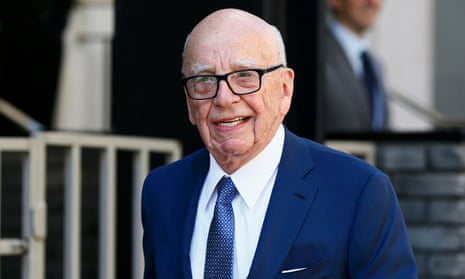Rupert Murdoch is likely to lose nearly all of the $100m he invested in Theranos, the blood testing startup beset by scandals exposed by the Wall Street Journal, his flagship business newspaper.
Murdoch is reported to have invested $100m in Theranos between 2014 and 2015, when its valuation was soaring thanks to the promise of being able to revolutionize blood testing by replacing needles with low-cost finger pricks.
The Wall Street Journal reported that Murdoch was part of a group of wealthy families and individuals who invested $632m in Theranos’s latest funding round at about $17 a share, giving the Silicon Valley company a valuation of nearly $9bn, and making it the highest-valued private healthcare startup in the US.
Murdoch is reported to have toured Theranos’s laboratories in Palo Alto and inspected its proprietary devices prior to investing.
The Wall Street Journal, which is owned by Murdoch’s publishing group News Corp, has published a series of investigative stories questioning the accuracy of Theranos’s testing and unusual management techniques.
The WSJ investigation, which kept going despite intense pressure on its whistleblower from Theranos and its board of high profile figures, led to a government investigation that found the company’s practices were putting patients’ lives at risk. Elizabeth Holmes, Theranos’s chief executive, was banned from the blood testing business for two years. Last month, the company shut down its labs.
The company – which Holmes founded when she was 19, in 2003 – is also facing both criminal and civil investigations by the US attorney’s office in San Francisco and the Securities and Exchange Commission, which is looking into whether the company misled investors and regulators.
Some investors on Monday launched their own lawsuit against the company, claiming they were misled. They said they hoped their suit would attract others and become a class action.
High-profile Theranos investors include the billionaire Riley Bechtel, chairman of the private construction giant Bechtel Group, and Cox Enterprises, the family-controlled conglomerate.
As well as attracting prominent investors, Theranos also secured big names for its board, including Henry Kissinger and George Shultz, both former secretaries of state.
The WSJ revealed earlier this month Shultz’s grandson was the whistleblower who approached the newspaper with his concerns about Theranos after they were dismissed by Holmes. Tyler Shultz, 26, joined Theranos in 2013 and quit in 2014 after his concerns were labelled arrogant, patronizing and reckless.
News Corp and Theranos declined to comment.
